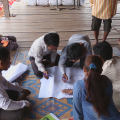Understanding local realities: How to reduce water insecurity at the local community level
How can researchers build trust to work on water insecurity issues with local communities? SUMERNET Learning Forum 2024 highlighted some success stories.
Collaborating with the locals
At the SUMERNET Learning Forum 2024 held on 30 May, many participants emphasized the vital role played by researchers working at the community level.
Researchers need to cooperate with local communities and the local government to gain insights into the realities of water management at the grassroots level.
One effective way to approach the local government is to talk with them for a long time, listen to their concerns, and build relationships. This can help the researchers to understand the local government's perspectives.
We should engage more with the local government or local officials and by providing accurate evidence so that they we can learn together,
said Dr. Le Thanh Nhan, Deputy Director of Economy & Environment Partnership for Southeast Asia (EEPSEA), about his experience in Vietnam.

Water insecurity directly affects local people, and their voices must be heard.
Many civil society organizations (CSOs) work at the local level and are important actors. Ms. Yada Watanapornmongkol from USAID-WWF Mekong for the Future emphasized that we should foster cross-collaboration among different types of networks, such as civil society organizations (CSO) and researchers because each group can bring their unique perspectives and expertise to strengthen efforts towards reducing water security in the Mekong Region.
Building trust with the communities
Ms. Yada explained that the approach of Mekong for the Future, a civil society organization in Thailand, is to work closely with other CSOs and the local communities to build trust at the regional level. This approach helps to create a stronger relationship between the CSOs and the local communities.
There should be more regional dialogue to allow CSOs and local communities to talk and share their experiences and lessons learned on the ground. (Ms. Yada Watanapornmongkol)

Mr. Preecha Srisuwan, Head of Public Relations and Media for the Association of Northeast Thailand Community Network (Comnet), shared his experiences working with local communities in northeast Thailand. He said building a close relationship with local communities is vital to understanding the concerns of farmers and fishers.
Sincerity is an important part of our work. We need to show them that in our work, we sincerely want to help the community to protect their resources. (Mr. Preecha Srisuwan)

Working at the local level
Researchers must prioritize active cooperation at the local level to better understand the concerns and problems with water insecurity at the regional level. This involves working closely and building trust with local government, CSOs, communities, and the local media to help raise awareness about environmental issues with the broader public.
The SUMERNET Learning Forum 2024 hosted the knowledge panel “Regional networks and their achievements in addressing water insecurity” knowledge panel to highlight researchers’ experiences and media efforts to reduce water insecurity in the Mekong Region.
*Photo 1: Knowledge Panel: Regional networks and their achievements in addressing water insecurity. Photo: SEI Asia.
*Photo 2: Dr. Le Thanh Nhan, Deputy Director, Economy & Environment Partnership for Southeast Asia (EEPSEA). Photo: SEI Asia.
*Photo 3: Ms. Yada Watanapornmongkol, USAID-WWF Mekong for the Future. Photo: SEI Asia.
*Photo 4: Mr. Preecha Srisuwan, Head of Public Relations and Media for the Association of Northeast Thailand Community Network (Comnet). Photo: SEI Asia.
Info
This story is part of the following project
SUMERNET 4 All: Engaging with water insecurity in the Mekong Region
Topic
Country
Related people
You might be interested in
-
SUMERNET Vision Guide introducing the new phase "SUMERNET 4 All"
The new, revised "Vision Guide" for SUMERNET is now available. This vision guide presents an overview of SUMERNET - its origins and governance structure, background to the network, aims, key research areas, engagement with policy, and outreach products
![SUMERNET Vision Guide introducing the new phase "SUMERNET 4 All"]()
-
SUMERNET 4 All Call for Proposals on Joint Action
SUMERNET 4 All (S4A) provides financial support and technical assistance to consortia of researchers and boundary partners from the Mekong Region
![SUMERNET 4 All Call for Proposals on Joint Action]()
-
SUMERNET launches redesigned website to provide a fresh visual look and direction
SUMERNET is proud to announce the launch of our redesigned website to coincide with our new phase of work on addressing water insecurity in the Mekong Region.
![SUMERNET launches redesigned website to provide a fresh visual look and direction]()
 By
By 



 Read more about SUMERNET
Read more about SUMERNET
